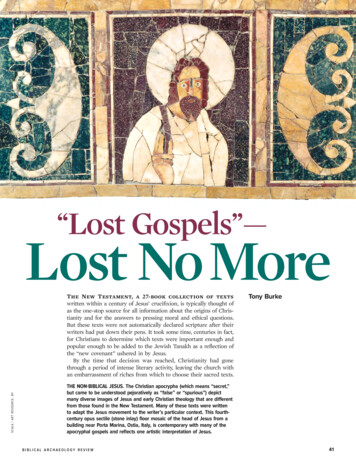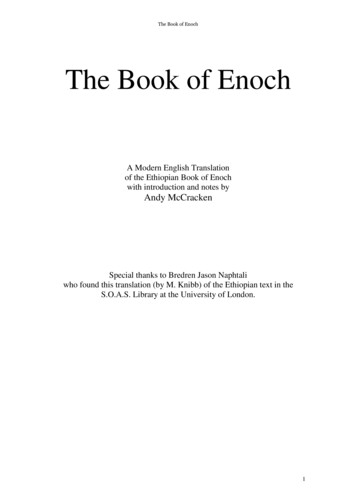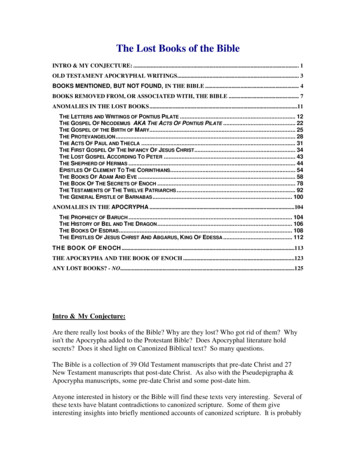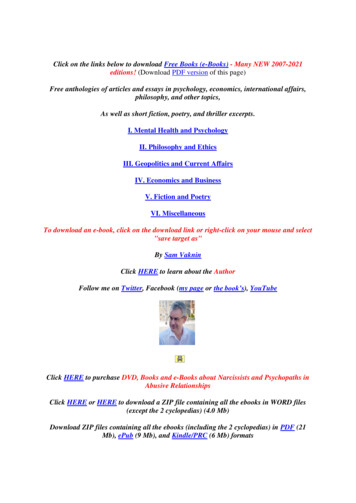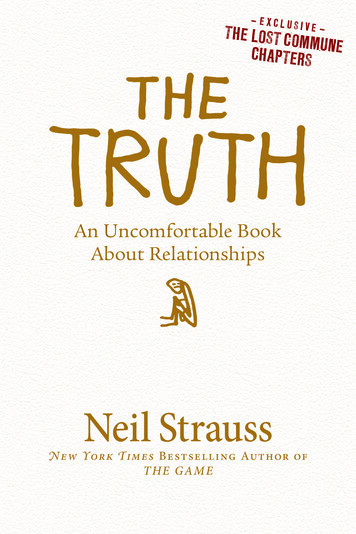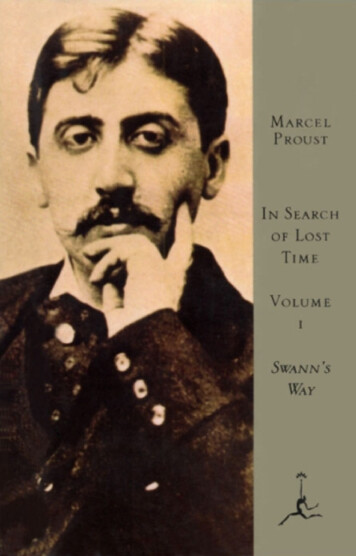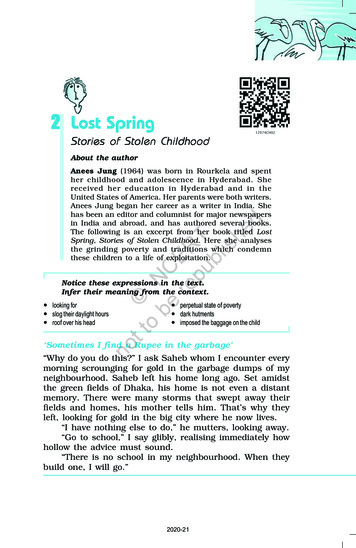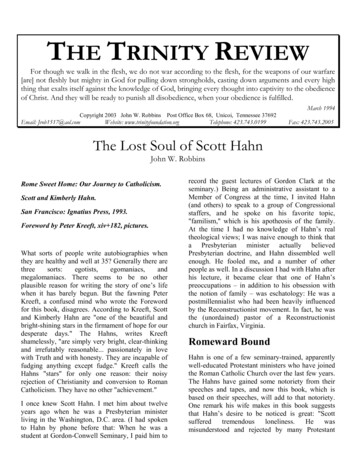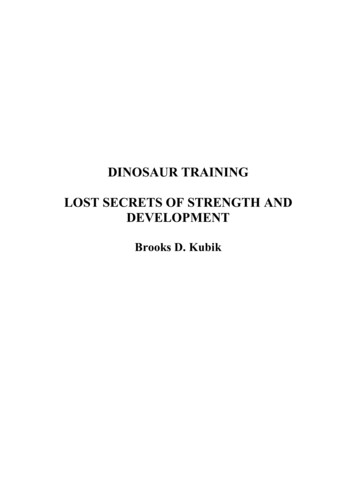
Transcription
The Lost Books of the Bible, [1926], at sacred-texts.comFROM: ost BooksOF THEBIBLE
BEING ALL THE GOSPELS, EPISTLES, AND OTHER PIECES NOW EXTANT ATTRIBUTED INTHE FIRST FOUR CENTURIESTOJESUS CHRISTHIS APOSTLES AND THEIR COMPANIONSNOT INCLUDED, BY ITS COMPILERS, IN THE AUTHORIZED NEW TESTAMENT; AND, THERECENTLY DISCOVERED SYRIAC MSS. OF PILATE'S LETTERS TO TIBERIUS, ETC.TRANSLATED FROM THE ORIGINAL TONGUESILLUSTRATED FROM ANCIENT PAINTINGS AND MISSALSNew York: Alpha House[1926]Scanned, proofed and formatted at sacred-texts.com, August 2009, by John Bruno Hare.This text is in the public domain in the US because its copyright was not renewed in a timelyfashion."Christ was the joyous boy of the fields. We are not permitted to think that the shadows of Calvarydarkened His pathway as a youth, and the Apocryphal Books of the New Testament show a greatdeal of the early life of Christ not to be found in the four Evangelists."--DR. TALMAGE
IntroductionThe Order of All the BooksPrefaceThe Gospel of the Birth of MaryThe ProtevangelionThe First Gospel of the Infancy of Jesus ChristThomas's Gospel of the Infancy of Jesus ChristThe Epistles of Jesus Christ and Abgarus King of EdessaThe Gospel of Nicodemus, Formerly Called the Acts of Pontius PilateThe Apostles’ CreedThe Epistle of Paul the Apostle to the LaodiceansThe Epistles of Paul the Apostle to Seneca, with Seneca's to PaulThe Acts of Paul and TheclaThe First Epistle of Clement to the CorinthiansThe Second Epistle of Clement to the CorinthiansThe General Epistle of BarnabasThe Epistle of Ignatius to the EphesiansThe Epistle of Ignatius to the MagnesiansThe Epistle of Ignatius to the TralliansThe Epistle of Ignatius to the RomansThe Epistle of Ignatius to the PhiladelphiansThe Epistle of Ignatius to the SmyrnæansThe Epistle of Ignatius to PolycarpThe Epistle of Polycarp to the PhilippiansThe Shepherd of HermasThe Second Book of Hermas, Called His CommandsThe Third Book of Hermas, Which Is Called His SimilitudesLetters of Herod and PilateThe Lost Gospel According to PeterTable I.Table II.
INTRODUCTION TO THE LOST BOOKS OF THE BIBLEBy DR. FRANK CRANETHE great things in this world are growths.This applies to books as well as to institutions.The Bible is a growth. Many people do not understand that it is not a book written by a singleperson, but it is a library of several books which were composed by various people in variouscountries. It is interesting to know how this library grew and upon what principle some books wereaccepted and some rejected.Of course we may take people's word for the reasons why certain books were chosen, but it isalways satisfactory to come to our own conclusions by examining our own evidence.This is what this Lost Books of the Bible enables us to do. We can examine the books of theScriptures which we have in the authorized version, and then in this book we can read thosescriptures which have been eliminated by various councils in order to make up our standard Bible.It is safe to say that a comparison of the accepted books with those rejected may be relied upon,for those books which were accepted are far superior in value to the others.These others which are included in the Lost Books of the Bible comprise all kinds of stories, talesand myths.No great figure appears in history without myths growing up about him. Every great personagebecomes a nucleus or center about which folk tales cluster.There are apocryphal tales about Napoleon, about Charlemagne, about Julius Caesar and otheroutstanding characters.It is impossible that a man representing so great a force as Jesus of Nazareth should appear inthe world without finding many echoes of His personality in contemporary literature--many storieswhich grew up about Him as time elapsed.What these tales and stories are, just how He appears to the fictional minds of His day andafterwards, it is interesting to note.Very often the fiction writer depicts life and the great truth of life better than the historian. He doesnot pretend to write down what is exactly true, but he tinges all things with his imagination. Hisfeelings, however, may be just and reliable.The reading of this Lost Books of the Bible is interesting as a matter of course. All who in any wayare attracted by the personage of Jesus are interested to know any stories that may have grownup about Him.They are also valuable because they enable us to get many a point of view which otherwise wouldhave been lost.History may be true, but in a sense tradition is even truer. It has been said that history recordswhat has been, but tradition tells what ought to have been.
It must be remembered also that such a thing as historical accuracy is a comparatively novelproduct. The older writers never dreamed of it. They wrote in order to be interesting, not to tell thetruth. And it is a remarkable fact that the events recorded in the Holy Scriptures, as far as we canfind out, were most of them veritable, and the chroniclers were truthful.In this volume all these apocryphal volumes are presented without argument or commentation.The reader's own judgment and common sense are appealed to. It makes no difference whetherhe is Catholic or Protestant or Hebrew. The facts are plainly laid before him. These facts for a longtime have been the peculiar esoteric property of the learned. They were available only in theoriginal Greek and Latin and so forth. Now they have been translated and brought in plain Englishbefore the eye of every reader.The ordinary man has therefore the privilege of seeing upon what grounds the commonlyaccepted Scriptures rest. He can examine the pile of evidence and do his own sifting.Thousands of people to-day look to the New Testament narrative as their leader and guide. It isimportant to know upon what authority this rests, and many a man will be delighted to find theevidence thus clearly presented before him.The Lost Books of the Bible present all sorts of matter before the curious eye. There are storiesabout Mary and instances of her personal life. There are other stories about the boyhood of Jesusand instances about His crucifixion. All of these become important because of the central figureabout whom they revolve.No man has ever appealed to the imagination of the world and so played upon its feelings as hasJesus of Nazareth.It is interesting to know what forms of stories and speculations about Him took place in the earlyperiod of the Christian era.In other words, the ordinary man is invited to take his place in that council chamber which acceptsand rejects the various writings of Scripture. It is safe to say that the conclusions desired cansafely be left to his common sense. It can no longer be said that our Scriptures were accepted bylearned men; you do not know that, but you must accept their conclusions. Now it is shown youupon what grounds these conclusions rest.As a believer in the authenticity of our accepted Scriptures I have no hesitancy in saying that I amperfectly satisfied to let the common sense of the world decide upon the superiority of theaccepted text.The publication of this book will do good because it takes away the veil of secrecy that has hiddenfor many years the act of the church in accepting certain Scriptures and rejecting others. All of thegrounds are rendered perfectly intelligible to the common man.
PREFACEYOU will find between these covers all the ecclesiastical writings of early Christian authorities thatare known to exist, and yet were omitted from the authorized New Testament.They are published here as a matter of record. Whether they are canonical or not, at least thesewritings are of very great antiquity.Origins are noted in paragraphs at the front of each book. This will enable the reader to form hisown conclusions as to the genuineness of the writings. These writings are a vivid picture of theminds of men in the post-Apostolic period of the Church. Discount the statements from thehistorical viewpoint as you will--there remains in these gospels and epistles an earnestness ofpurpose, and zeal to express a message, similar to that of our authorized Bible.An interesting question naturally arises as to why these writings were cast out in the selection ofthe material that has come down to us in the authorized version.The compilation of the Bible was not an act of any definite occurrence. It was a matter complicatedand abstruse. It was an evolution at the hands of Churchmen of various beliefs and purposes. Inthe formulation of early church doctrines there was dissension, personal jealousy, intolerance,persecution, bigotry. That out of this welter should have arisen the Bible, with its fine inspiration,would seem to present a plausible basis for belief in its Divine origin.But who can deny that under such vicious and human circumstances much writing of as purepurpose and as profound sincerity as other that is included in the authorized Bible, must havebeen omitted? The story of the first council of Nice, when Arius was commanded by the Bishop ofAlexandria to quit his beliefs or be declared a heretic, and his writings were ordered destroyed, iseloquent of many things that happened. Good men were engaged on both sides of theecclesiastical controversies.About two thirds of this volume is occupied with epistles. Beginning on page 91 you will discoverotherwise generally unknown letters of Paul; and the illuminating letters of Clement and others,concluding with correspondence and reports of Herod, Pontius Pilate, and Tiberius Caesar.Concerning these epistles Archbishop of Canterbury Wake, who translated them from theoriginals, says that here is a full and perfect collection of "all the genuine writings that remain to usof the Apostolic Fathers, and carry on the antiquity of the Church from the time of the HolyScriptures of the New Testament to about a hundred and fifty years after Christ; that except theHoly Scriptures, there is nothing remaining of the truly genuine Christian antiquity more early; thatthey contain all that can with any certainty be depended upon of the most Primitive Fathers, whohad not only the advantage of living in the apostolical times, of hearing the Holy Apostles, andconversing with them, but were most of them persons of a very eminent character in the church,too: that we cannot with any reason doubt of what they deliver to us as the Gospel of Christ, butought to receive it, if not with equal veneration, yet but a little less respect than we do the SacredWritings of those who were their masters and instructors;" and, "if," says the Archbishop, "it shallbe asked how I came to choose the drudgery of a translator, rather than the more ingenious partof publishing somewhat of my own composing, it was, in short, this; because I hoped that suchwritings as these would find a more general and unprejudiced acceptance with all sorts of menthan anything that could be written by anyone now living."This collection of The Lost Books of the Bible, is published, without prejudice or motive, save thatthe reader may find whatever pleases and instructs him, and may be free to enjoy his ownspeculation and hold his own opinion of these ancient and beautiful writings.R.H.P., Jr.New York, January 1, 1926.
THELost Books of the BibleThe GOSPEL of the BIRTH OF MARY.[In the primitive ages there was a Gospel extant bearing this name, attributed to St. Matthew, andreceived as genuine and authentic by several of the ancient Christian sects. It is to be found in theworks of Jerome, a Father of the Church, who flourished in the fourth century, from whence thepresent translation is made. His contemporaries, Epiphanius, Bishop of Salamis, and Austin, alsomention a Gospel under this title. The ancient copies differed from Jerome's, for from one of themthe learned Faustus, a native of Britain, who became Bishop of Riez, in Provence, endeavoured toprove that Christ was not the Son of God till after his baptism; and that he was not of the house ofDavid and tribe of Judah, because, according to the Gospel he cited, the Virgin herself was not ofthis tribe, but of the tribe of Levi; her father being a priest of the name of Joachim. It was likewisefrom this Gospel that the sect of the Collyridians, established the worship and offering of manchetbread and cracknels, or fine wafers, as sacrifices to Mary, whom they imagined to have been bornof a Virgin, as Christ is related in the Canonical Gospel to have been born of her. Epiphaniuslikewise cites a passage concerning the death of Zacharias, which is not in Jerome's copy, viz."That it was the occasion of the death of Zacharias in the temple, that when he had seen a vision,he, through surprise, was willing to disclose it, and his mouth was stopped. That which he sawwas at the time of his offering incense, and it was a man standing in the form of an ass. When hewas gone out, and had a mind to speak thus to the people, Woe unto you, whom do ye worship?he who had appeared to him in the temple took away the use of his speech. Afterwards when herecovered it, and was able to speak, he declared this to the Jews, and they slew him. They add(viz. the Gnostics in this book), that on this very account the high-priest was appointed by theirlawgiver (by God to Moses), to carry little bells, that whensoever he went into the temple tosacrifice, he, whom they worshipped, hearing the noise of the bells, might have time enough tohide himself; and not be caught in that ugly shape and figure."--The principal part of this Gospel iscontained in the Protevangelion of James, which follows next in order.]CHAP. I.1 The parentage of Mary. 7 Joachim her father, and Anna her mother, go to Jerusalem to the feastof the dedication. 9 Issachar the high priest reproaches Joachim for being childless.THE blessed and ever glorious Virgin Mary, sprung from the royal race and family of David, wasborn in the city of Nazareth, and educated at Jerusalem, in the temple of the Lord.2 Her father's name was Joachim, and her mother's Anna. The family of her father was of Galileeand the city of Nazareth. The family of her mother was of Bethlehem.3 Their lives were plain and right in the sight of the Lord, pious and faultless before men. For theydivided all their substance into three parts:4 One of which they devoted to the temple and officers of the temple; another they distributedamong strangers, and persons in poor circumstances; and the third they reserved for themselvesand the uses of their own family.
5 In this manner they lived for about twenty years chastely, in the favour of God, and the esteemof men, without any children.6 But they vowed, if God should favour them with any issue, they would devote it to the service ofthe Lord; on which account they went at every feast in the year to the temple of the Lord [*1]7 And it came to pass, that when the feast of the dedication drew near, Joachim, with someothers of his tribe, went up to Jerusalem, and at that time, Issachar was high-priest;8 Who, when he saw Joachim along with the rest of his neighbours, bringing his offering, despisedboth him and his offerings, and asked him,9 Why he, who had no children, would presume to appear among those who had? Adding, that hisofferings could never be acceptable to God, who wasjudged by him unworthy to have children; the Scripture having said, Cursed is every one who shallnot beget a male in Israel.10. He further said, that he ought first to be free from that curse by begetting some issue, and thencome with his offerings into the presence of God.11 But Joachim being much confounded with the shame of such reproach, retired to theshepherds, who were with the cattle in their pastures;12 For he was not inclined to return home, lest his neighbours, who were present and heard allthis from the high-priest, should publicly reproach him in the same manner.CHAP. II.1 An angel appears to Joachim, 9 and informs him that Anna shall conceive and bring forth adaughter, who shall be called Mary, 11 be brought up in the temple, 12 and while yet a virgin, in away unparalleled, bring forth the Son of God: 13 gives him a sign, 14 and departs.BUT when he had been there for some time, on a certain day when he was alone, the angel of theLord stood by him with a prodigious light.2 To whom, being troubled at the appearance, the angel who had appeared to him, endeavouringto compose him said:3 Be not afraid, Joachim, nor troubled at the sight of me, for I am an angel of the Lord sent by himto you, that I might inform you, that your prayers are heard, and your alms ascended in the sight ofGod. [*2]4 For he hath surely seen your shame, and heard you unjustly reproached for not having children:for God is the avenger of sin, and not of nature;5 And so when he shuts the womb of any person, he does it for this reason, that he may in a morewonderful manner again open it, and that which is born appear to be not the product of lust, butthe gift of God.6 For the first mother of your nation Sarah, was she not barren even till her eightieth year: And yeteven in the end of her old age brought forth Isaac, in whom the promise was made a blessing toall nations. [*3]
7 Rachel also, so much in favour with God, and beloved so much by holy Jacob, continued barrenfor a long time, yet afterwards was the mot her of Joseph, who was not only governor of Egypt, butdelivered many nations from perishing with hunger. [*1]8 Who among the judges was more valiant than Samson, or more holy than Samuel? And yet boththeir mothers were barren. [*2]9 But if reason will not convince you of the truth of my words, that there are frequent conceptionsin advanced years, and that those who were barren have brought forth to their great surprise;therefore Anna your wife shall bring you a daughter, and you shall call her name Mary;10 She shall, according to your vow, be devoted to the Lord from her infancy, and be filled with theHoly Ghost from her mother's womb; [*3]11 She shall neither eat nor drink anything which is unclean, nor shall her conversation be withoutamong the common people, but in the temple of the Lord; that so she may not fall under anyslander or suspicion of what is bad.12 So in the process of her years, as she shall be in a miraculous manner born of one that wasbarren, so she shall, while yet a virgin, in a way unparalleled, bring forth the Son of the most HighGod, who shall, be called Jesus, and, according to the signification of his name, be the Saviour ofall nations. [*4]13 And this shall be a sign to you of the things which I declare, namely, when you come to thegolden gate of Jerusalem, you shall there meet your wife Anna, who being very much troubled thatyou returned no sooner, shall then rejoice to see you.14 When the angel had said this he departed from him.CHAP. III.1 The angel appears to Anna; 2 tells her a daughter shall be born unto her, 3 devoted to theservice of the Lord in the temple, 5, who, being a virgin and not knowing man, shall bring forth theLord, 6 and gives her a sign therefore. 8 Joachim and Anna meet and rejoice, 10 and praise theLord. 11 Anna conceives, and brings forth a daughter called Mary.AFTERWARDS the angel appeared to Anna his wife saying: Fear not, neither think that which yousee is a spirit. [*5]2 For I am that angel who hath offered up your prayers and alms before God, and am now sent toyou, that I may inform you, that a daughter will be born unto you, who shall be called Mary, andshall be blessed above all women. [*6]3 She shall be, immediately upon her birth, full of the grace of the Lord, and shall continue duringthe three years of her weaning in her father's house, and afterwards, being devoted to the serviceof the Lord, shall not depart from the temple, till she arrives to years of discretion.4 In a word, she shall there serve the Lord night and day in fasting and prayer, [*7] shall abstainfrom every unclean thing, and never know any man;5 But, being an unparalleled instance without any pollution or defilement, and a virgin not
knowing any man, shall bring forth a son, and a maid shall bring forth the Lord, who both by hisgrace and name and works, shall be the Saviour of the world.6 Arise therefore, and go up to Jerusalem, and when you shall come to that which is called thegolden gate (because it is gilt with gold), as a sign of what I have told you, you shall meet yourhusband, for whose safety you have been so much concerned.7 When therefore you find these things thus accomplished, believe that all the rest which I havetold you, shall also undoubtedly be accomplished.8 According therefore to the command of the angel, both of them left the places where they were,and when they came to the place specified in the angel's prediction, they met each other.9 Then, rejoicing at each other's vision, and being fully satisfied in the promise of a child, theygave due thanks to the Lord, who exalts the humble.10 After having praised the Lord, they returned home, and lived in a cheerful and assuredexpectation of the promise of God.11 So Anna conceived, and brought forth a daughter, and, according to the angel's command, theparents did call her name Mary.CHAP. IV.1 Mary brought to the temple at three years old. 6 Ascends the stairs of the temple by miracle. 8Her parents sacrificed and returned home.AND when three years were expired, and the time of her weaning complete, they brought theVirgin to the temple of the Lord with offerings.2 And there were about the temple, according to the fifteen Psalms of degrees, [*1] fifteen stairs toascend.3 For the temple being built in a mountain, the altar of burnt-offering, which was without, could notbe come near but by stairs;4 The parents of the blessed Virgin and infant Mary put her upon one of these stairs;5 But while they were putting off their clothes, in which they had travelled, and according tocustom putting on some that were more neat and clean,6 In the mean time the Virgin of the Lord in such a manner went up all the stairs one after another,without the help of any to lead or lift her, that any one would have judged from hence that she wasof perfect age.7 Thus the Lord did, in the infancy of his Virgin, work this extraordinary work, and evidence by thismiracle how great she was like to be hereafter.8 But the parents having offered up their sacrifice, according to the custom of the law, andperfected their vow, left the Virgin with other virgins in the apartments of the temple, who were tobe brought up there, and they returned home.
CHAP. V.2 Mary ministered unto by angels. 4 The high-priest orders all virgins of fourteen years old to quitthe temple and endeavour to be married. 5 Mary refuses, 6 having vowed her virginity to the Lord.7 The high-priest commands a meeting of the chief persons of Jerusalem, 11 who seek the Lordfor counsel in the matter. 13 A voice from the mercy-seat. 15 The high priest obeys it by orderingall the unmarried men of the house of David to bring their rods to the altar, 17 that his rod whichshould flower, and on which the Spirit of God should sit, should betroth the Virgin.BUT the Virgin of the Lord, as she advanced in fears, increased also in perfections, and accordingto the saying of the Psalmist, her father and mother forsook her, but the Lord took care of her.2 For she every day had the conversation of angels, and every day received visitors from God,which preserved her from all sorts of evil, and caused her to abound with all good things;3 So that when at length she arrived to her fourteenth year, as the wicked could not lay anything toher charge worthy of reproof, so all good persons, who were acquainted with her, admired her lifeand conversation.4 At that time the high-priest made a public order. That all the virgins who had public settlementsin the temple, and were come to this age, should return home, and, as they were now of a propermaturity, should, according to the custom of their country, endeavour to be married.5 To which command, though all the other virgins readily yielded obedience, Mary the Virgin of theLord alone answered, that she could not comply with it.6 Assigning these reasons, that both she and her parents had devoted her to the service of theLord; and besides, that she had vowed virginity to the Lord, which vow she was resolved never tobreak through by lying with a man.7 The high priest being hereby brought into a difficulty,8 Seeing he durst neither on the one hand dissolve the vow, and disobey the Scripture, whichsays, Vow and pay, [*1]9 Nor on the other hand introduce a custom, to which the people were strangers, commanded,10 That at the approaching feast all the principal persons both of Jerusalem and the neighbouringplaces should meet together, that he might have their advice, how he had best proceed in sodifficult a case.11 When they were accordingly met, they unanimously agreed to seek the Lord, and ask counselfrom him on this matter. [*2]12 And when they were all engaged in prayer, the high-priest, according to the usual way, went toconsult God.13 And immediately there was a voice from the ark, and the mercy seat, which all present heard,that it must be inquired or sought out by a prophecy of Isaiah to whom the Virgin should be givenand be betrothed;14 For Isaiah saith, there shall come forth a rod out of the stem of Jesse, and a flower shall springout of its root,
15 And the Spirit of the Lord shall rest upon him, the Spirit of Wisdom and Understanding, theSpirit of Counsel and Might, the Spirit of Knowledge and Piety, and the Spirit of the fear of the Lordshall fill him.16 Then, according to this prophecy, he appointed, that all the men of the house and family ofDavid, who were marriageable, and not married, should bring their several rods to the altar,17 And out of whatsoever person's rod after it was brought, a flower should bud forth, and on thetop of it the Spirit of the Lord should sit in the appearance of a dove, he should be the man towhom the Virgin should be given and be betrothed.CHAP. VI.1 Joseph draws back his rod. 5 The dove pitches on it. He betroths Mary and returns toBethlehem. 7 Mary returns to her parents' house at Galilee.AMONG the rest there was a man named Joseph, of the house and family of David, and a personvery far advanced in years, who drew back his rod, when every one besides presented his.2 So that when nothing appeared agreeable to the heavenly voice, the high-priest judged it properto consult God again,3 Who answered that he to whom the Virgin was to be betrothed was the only person of those whowere brought together, who had not brought his rod.4 Joseph therefore was betrayed.5 For, when he did bring his rod, and a dove coming from Heaven pitched upon the top of it, everyone plainly saw, that the Virgin was to be betrothed to him:6 Accordingly, the usual ceremonies of betrothing being over, he returned to his own city ofBethlehem, to set his house in order, and make the needful for the marriage.7 But the Virgin of the Lord, Mary, with seven other virgins of the same age, who had beenweaned at the same time, and who had been appointed to attend her by the priest, returned to herparents' house in Galilee.CHAP. VII.7 The salutation of the Virgin by Gabriel, who explains to her that she shall conceive, without lyingwith a man, while a Virgin, 19 by the Holy Ghost coming upon her without the heats of lust. 21 Shesubmits.NOW at this time of her first coming into Galilee, the angel Gabriel was sent to her from God, todeclare to her the conception of our Saviour, and the manner and way of her conceiving him.2 Accordingly going into her, he filled the chamber where she was with a prodigious light, and in amost courteous manner saluting her, he said,3 Hail, Mary! Virgin of the Lord most acceptable! O Virgin full of Grace! The Lord is with you, youare blessed above all women, you are blessed above all men, that. have been hitherto born. [*1]
4 But the Virgin, who had before been well acquainted with the countenances of angels, and towhom such light from heaven was no uncommon thing,5 Was neither terrified with the vision of the angel, nor astonished at the greatness of the light, butonly troubled about the angel's words:6 And began to consider what so extraordinary a salutation should mean, what it did portend, orwhat sort of end it would have. [*2]7 To this thought the angel, divinely inspired, replies;8 Fear not, Mary, as though I intended anything inconsistent with your chastity in this salutation:9 For you have found favour with the Lord, because you made virginity your choice.10 Therefore while you are a Virgin, you shall conceive without sin, and bring forth a son.11 He shall be great, because he shall reign from sea to sea, and from the rivers to the ends of theearth. [*1]12 And he shall be called the Son of the Highest; for he who is born in a mean state on earthreigns in an exalted one in heaven.13 And the Lord shall give him the throne of his father David, and he shall reign over the house ofJacob for ever, and of his kingdom there shall be no end.14 For he is the King of Kings, and Lord of Lords, and his throne is for ever and ever.15 To this discourse of the angel the Virgin replied not, as though she were unbelieving, but willingto know the manner of it.16 She said, How can that be? For seeing, according to my vow, I have never known any man,how can I bear a child without the addition of a man's seed?17 To this the angel replied and said, Think not, Mary, that you shall conceive in the ordinary way.18 For, without lying with a man, while a Virgin, you shall conceive; while a Virgin, you shall bringforth; and while a Virgin shall give suck.19 For the Holy Ghost shall come upon you, and the power of the Most High shall overshadowyou, without any of the heats of lust.20 So that which shall be born of you shall be only holy, be. cause it only is conceived without sin,and being born, shall be called the Son of God.21 Then Mary stretching forth he
This collection of The Lost Books of the Bible, is published, without prejudice or motive, save that the reader may find whatever pleases and instructs him, and may be free to enjoy his own speculation and hold his own opinion of these ancient and beaut
